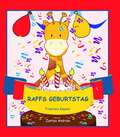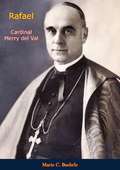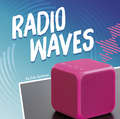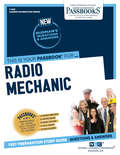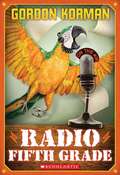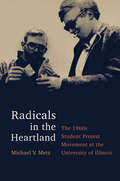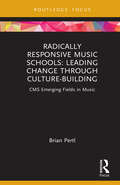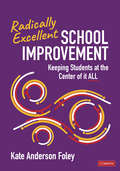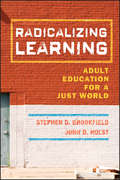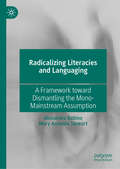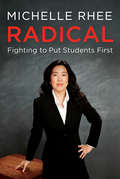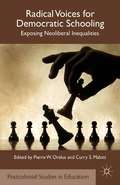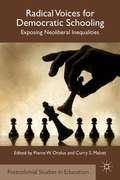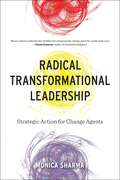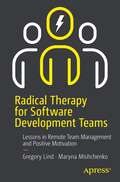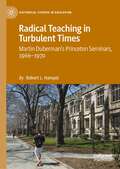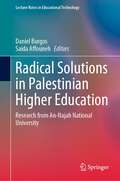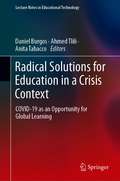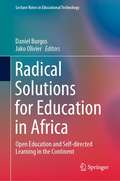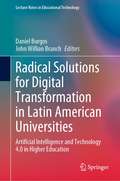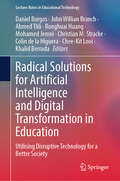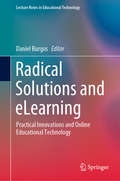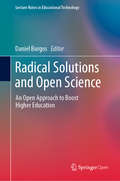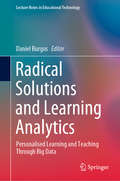- Table View
- List View
Raffs Geburtstag (Dschunglies #4)
by Francois Keyser Beatrice Pires-StadlerDie Freunde von Raff, der Giraffe, planen eine Party, aber Raff ist nicht eingeladen. Raff findet das heraus und fühlt sich beleidigt. Warum würden seine Freunde so etwas tun? In diesem Buch der Dschunglis Reihe lernen junge Leser, dass sie immer alle Fakten zuerst sicherstellen sollten, bevor sie Vermutungen anstellen. Jedes der „Dschunglis“ Kinderbücher enthält eine Lehre, die sich junge Leser zu Herzen nehmen sollten. Dies bietet Eltern eine wunderbare Gelegenheit, sie ihren Kindern beim gemeinsamen Lesen zu erklären. Die Bücher bieten auch eine gute Plattform, mit jungen Lesern über „Einheit in Vielfalt“ zu sprechen. Alle Charaktere werden von verschiedenen Tieren dargestellt. Als Freunde arbeiten sie zusammen, um so ihre Herausforderungen zu überwinden und Spaß zu haben. Die Bücher eignen sich auch, um mit Kindern über bedrohte Arten zu sprechen. Jedes Tier wird durch eine Figur mit einer gefährdeten Unterart dargestellt. Die Bücher sind für junge Leser im Alter von 1 bis 7 Jahren gedacht.
Rafael, Cardinal Merry del Val: Cardinal Merry Del Val
by Marie C. Buehrle"Give me souls, take away all else." This earnest appeal of Cardinal Merry del Val reveals the secret of his life, the story of his ambitions and joys. As man and prelate, few dignitaries of the Church during the early part of this century have left such an impression of culture, holiness, and statesmanship. Irish and Spanish by blood, English by birth and education, cosmopolitan by office, and Catholic in the deepest and truest sense of the word, his ideal was to be a priest in a poor parish in England but he was launched on a diplomatic career opposed to his tastes, his ideals, and his spiritual interests. In the course of his life he became a close friend of two great Popes, Leo XIII and Pius X, with whom he worked on famous reforms and on crucial modern problems. In the early years of his priesthood, Merry del Val organized a club for boys in Trastevere, a rough quarter in Rome, and even when he was Secretary of State under Pius X, he did not miss a day in a visit to this Association.—Print ed.
Radio Waves (Waves in Motion)
by Julia Garstecki-DerkovitzRadio waves aren't just for listening to your favorite radio station! They are used to make GPS receivers and wireless internet work. Scientists use radio telescopes to help them study space. With engaging, at-level text and colorful images, readers learn about radio waves and how we use them every day.
Radio Mechanic: Passbooks Study Guide (Career Examination Series #C-660)
by National Learning CorporationThe Radio Mechanic Passbook® prepares you for your test by allowing you to take practice exams in the subjects you need to study. It provides hundreds of questions and answers in the areas that will likely be covered on your upcoming exam, including but not limited to: radio and television repair and diagnostics; diagrams and schematics; fundamentals of electronics; and more.
Radio Fifth Grade
by Gordon KormanMayhem breaks out in the fifth grade when the Venice Menace bullies his classmates into letting him become a regular guest on "Kidsview," the school's radio program.
Radicals in the Heartland: The 1960s Student Protest Movement at the University of Illinois
by Michael V. MetzIn 1969, the campus tumult that defined the Sixties reached a flash point at the University of Illinois. Out-of-town radicals preached armed revolution. Students took to the streets and fought police and National Guardsmen. Firebombs were planted in lecture halls while explosions rocked a federal building on one side of town and a recruiting office on the other. Across the state, the powers-that-be expressed shock that such events could take place at Illinois's esteemed, conservative, flagship university--how could it happen here, of all places? Positioning the events in the context of their time, Michael V. Metz delves into the lives and actions of activists at the center of the drama. A participant himself, Metz draws on interviews, archives, and newspaper records to show a movement born in demands for free speech, inspired by a movement for civil rights, and driven to the edge by a seemingly never-ending war. If the sudden burst of irrational violence baffled parents, administrators, and legislators, it seemed inevitable to students after years of official intransigence and disregard. Metz portrays campus protesters not as angry, militant extremists but as youthful citizens deeply engaged with grave moral issues, embodying the idealism, naiveté, and courage of a minority of a generation.
Radically Responsive Music Schools: Leading Change through Culture-Building (CMS Emerging Fields in Music)
by Brian PertlRadically Responsive Music Schools is a philosophical reimagining of music higher education culture from the ground up, arguing that holistic cultural change is the key factor needed for music schools to prepare 21st-century graduates for contemporary challenges.The author discusses how university and conservatory music programs can incorporate traits they seek to foster in their students – creativity, innovation, improvisation, and entrepreneurial thinking – into the institutions themselves. Through Deep Listening exercises, thought experiments, and other activities, Pertl provides detailed scaffolding for creating music school cultures of belonging and collaboration, wellbeing and intention, curiosity and wonder, creativity and improvisation, and playfulness and joy. Unpacking the complexities of transforming institutional culture, this book envisions the modern school of music as agile, collaborative, and socially aware and outlines pathways for leaders to realize this vision.Radically Responsive Music Schools is an essential resource for college-level music education administrators, professors, students, or staff members interested in how institutional culture can act as a catalyst for radical change in music programs.
Radically Excellent School Improvement: Keeping Students at the Center of It All
by Kate Anderson FoleySix Steps to Improving Outcomes for Every Student When gaps keep ambitious instruction and engaging learning experiences out of reach of every student, including students with disabilities, those learning English, and others who tend to be left out of school improvement plans, it′s time for radical excellence! Radically Excellent School Improvement presents a model for ambitious improvement and tireless focus that ensures every student grows, thrives, and achieves to their fullest potential. It provides district and school leaders with a bold blueprint for designing, implementing, and monitoring a comprehensive school improvement process for radical excellence. Inside, you′ll find: A six-step school improvement process that ensures all students have access to high-quality instruction Ways for districts and schools to ensure they meet legal and ethical standards Figures, examples, case studies, end-of-chapter summaries, and appendices Written by a transformational leader with years of experience leading districts and states toward equitable, integrated, and inclusive services for all, this resource is a must-read for education leaders who aspire to create a learning environment focused on providing every student the opportunity to achieve.
Radically Excellent School Improvement: Keeping Students at the Center of It All
by Kate Anderson FoleySix Steps to Improving Outcomes for Every Student When gaps keep ambitious instruction and engaging learning experiences out of reach of every student, including students with disabilities, those learning English, and others who tend to be left out of school improvement plans, it′s time for radical excellence! Radically Excellent School Improvement presents a model for ambitious improvement and tireless focus that ensures every student grows, thrives, and achieves to their fullest potential. It provides district and school leaders with a bold blueprint for designing, implementing, and monitoring a comprehensive school improvement process for radical excellence. Inside, you′ll find: A six-step school improvement process that ensures all students have access to high-quality instruction Ways for districts and schools to ensure they meet legal and ethical standards Figures, examples, case studies, end-of-chapter summaries, and appendices Written by a transformational leader with years of experience leading districts and states toward equitable, integrated, and inclusive services for all, this resource is a must-read for education leaders who aspire to create a learning environment focused on providing every student the opportunity to achieve.
Radicalizing Learning
by Stephen D. Brookfield John D. HolstRadicalizing Learning calls for a total rethinking of what the field of adult education stands for and how adult educators should assess their effectiveness. Arguing that major changes in society are needed to create a more just world, the authors set out to show how educators can help learners envision and enact this radical transformation.Specifically, the book explores the areas of adult learning, training, teaching, facilitation, program development, and research. Each chapter provides a guide to the different paradigms and perspectives that prevail across the field of theory and practice. The authors then tie all of the themes into how adult learning for participatory democracy works in a diverse society.
Radicalizing Literacies and Languaging: A Framework toward Dismantling the Mono-Mainstream Assumption
by Mary Amanda Stewart Alexandra BabinoThis book names and confounds the mono-mainstream assumption that invisibly frames much research, the ideologies that normalize monolingualism, monoculturalism, monoliteracy, mononationalism, and/or monomodal ways of knowing. In its place, the authors propose multi- and trans- lenses of these phenomena steeped in a raciolinguistic perspective on Bourdieu’s reflexive sociology to move toward a more accurate, multidimensional view of racialized peoples’ literacy and language practices. To achieve this, they first engage in a comprehensive review of literacies, languaging, and a critical sociocultural framework. Then, the distinct testimonios of four women underscore this framework in practice, followed by action steps for research, policy, and pedagogy. This book will be of particular interest to literacy and language education researchers.
Radical: Fighting to Put Students First
by Michelle RheeIn Radical, Michelle Rhee, a fearless and pioneering advocate for education reform, draws on her own life story and delivers her plan for better American schools.Rhee’s goal is to ensure that laws, leaders, and policies are making students—not adults—our top priority, and she outlines concrete steps that will put us on a dramatically different course. Informing her critique are her extraordinary experiences in education: her years of teaching in inner-city Baltimore; her turbulent tenure as chancellor of the Washington, DC public schools; and her current role as CEO of the education nonprofit StudentsFirst. Rhee draws on dozens of compelling examples from schools she’s worked in and studied, from students who’ve left behind unspeakable home lives and thrived in the classroom to teachers whose groundbreaking methods have produced unprecedented leaps in student achievement.An incisive and intensely personal call-to-arms, Michelle Rhee’s Radical is required reading for anyone who seeks a guide to not only the improvement of our schools, but also a brighter future for America’s children.
Radical Voices for Democratic Schooling: Exposing Neoliberal Inequalities (Postcolonial Studies in Education)
by P. Orelus C. MalottComprised of in-depth interviews and conversations with key figures in education and activism that thoroughly examine the intersection of neoliberalism, neocolonialism, and racism, this first-rate collection critically explores, through their teaching, various, important issues situated in the context of Western neoliberalism and neocolonialism.
Radical Voices for Democratic Schooling: Exposing Neoliberal Inequalities (Postcolonial Studies In Education)
by Pierre W. Orelus Curry S. MalottComprised of in-depth interviews and conversations with key figures in education and activism that thoroughly examine the intersection of neoliberalism, neocolonialism, and racism, this first-rate collection critically explores, through their teaching, various, important issues situated in the context of Western neoliberalism and neocolonialism.
Radical Transformational Leadership: Strategic Action for Change Agents
by Monica SharmaMonica Sharma describes how we can source our inner capacities and wisdom to manifest change that embodies universal values such as dignity, compassion, fairness, and courage. Drawing on more than twenty years of work for the United Nations and elsewhere, she presents a radical new approach to transformational leadership, one that creates systems of change where everyone can engage—not just analysts and policy-makers. Demonstrating that we all can be architects of a new humanity, Monica demystifies policy-making, planning, and implementation so that everyone can play an informed and strategic part in eradicating the world’s most intractable problems. Using real-life examples from around the world, she shows how our innate characteristics of universal compassion, equity impulse, and human capability can create new patterns that effectively address major challenges such as gross inequality, unbridled hate, conflicts based on social identity, and the never-enough mindset of greed. Written in a straightforward, accessible style, Radical Transformational Leadership outlines a path-breaking paradigm shift that is already generating equitable and sustainable results across the globe.
Radical Therapy for Software Development Teams: Lessons in Remote Team Management and Positive Motivation
by Gregory Lind Maryna MishchenkoBuild and maintain effective, collaborative, and motivated software development teams. This book addresses the challenges in doing so, like communication gaps, trust issues, and motivation problems, and provides strategies to overcome them. You'll be introduced to the Radical Therapy Dev philosophy, a holistic approach designed to optimize software development teams for better performance and overall well-being. This book highlights common pain points in software development and offers solutions to resolving much of the issues in teams. It offers strategies for implementation, focusing on adaptability and accountability, while also promoting community-supported standards. And, the book reveals why an emphasis on fostering a growth mindset, mentorship programs, and junior-intern initiatives promotes continuous learning and collaboration.With the rise of remote work, you'll see why hiring globally while thinking locally is gaining popularity. You'll also gain insights into removing barriers to remote work, along with tools and policies for remote collaboration. Additionally, the book explores the concept of cloud-native software development and its benefits. Radical Therapy for Software Development Teams critiques the traditional "agile" methodology, identifying its shortcomings while extracting valuable lessons that can still be applied effectively. What You Will LearnAddress communication gaps, foster trust, and nurture a growth mindset among team membersAvoid common feedback mistakes, recognize accomplishments, and implement a reward systemImprove software development practices and team dynamics Take a scientific approach to project management rather than traditional requirements gatheringBreak Down Communication BarriersWho This Book is ForSoftware development professionals
Radical Teaching in Turbulent Times: Martin Duberman’s Princeton Seminars, 1966–1970 (Historical Studies in Education)
by Robert L. HampelFrom 1966 to 1970, historian Martin Duberman transformed his undergraduate Princeton seminar on American radicalism. This book looks closely at the seminar, drawing on interviews with former students and colleagues, conversations with Duberman, and abundant archival material in the Princeton archives and the Duberman Papers. The array of evidence makes the book a primer on how historians gather and interpret evidence while at the same time shining light on the tumultuous late 1960s in American higher education. This book will become a tool for teaching, inspiring educators to rethink the ways in which history is taught and teaching students how to reason historically through sources.
Radical Solutions in Palestinian Higher Education: Research from An-Najah National University (Lecture Notes in Educational Technology)
by Daniel Burgos Saida AffounehThis book brings together education research and practice carried out by An-Najah National University, a lead Higher Institution in Palestine that managed to move from a face-to-face setting to a fully online learning and teaching environment during the initial COVID-19 outbreak, within a month, seamlessly, which makes a success cases study of virtualization. This book concentrates on approaches to ensure the continuous improvement and quality of higher education provision across the country, with particular focus on: a) learning and teaching methodologies in online settings; b) use of open education as a key resource; and c) development of academic capability building, along with academic and knowledge exchange with other higher education partners. Innovative ideas, best practices, and comparative case studies are presented, discussed, and compared with international ones to make specific recommendations for a successful and sustainable implementation.
Radical Solutions for Education in a Crisis Context: COVID-19 as an Opportunity for Global Learning (Lecture Notes in Educational Technology)
by Anita Tabacco Daniel Burgos Ahmed TliliThis book presents how to keep working on education in contexts of crisis, such as emergencies, zones of conflict, wars and health pandemics such as COVID-19. Specifically, this work shows a number of strategies to support global learning and teaching in online settings. Particularly, it first presents how to facilitate knowledge sharing and raising awareness about a specific crisis, to increase people’s safety, including educators and learners. The book then discusses various techniques, mechanisms and services that could be implemented to provide effective learning support for learners, especially in learning environments that they do not daily use, such as physical classrooms. Further, the work presents how to teach and support online educators, no matter if they are school teachers, university lecturers, youth social workers, vocational training facilitators or of any other kind. Finally, it describes worldwide case studies that have applied practical steps to keep education running during a crisis.This book provides readers with insights and guidelines on how to maintain learning undisrupted during contexts of crisis. It also provides basic and practical recommendations to the various stakeholders in educational contexts (students, content providers, technology services, policy makers, school teachers, university lecturers, academic managers, and others) about flexible, personalised and effective education in the context of crisis.
Radical Solutions for Education in Africa: Open Education and Self-directed Learning in the Continent (Lecture Notes in Educational Technology)
by Daniel Burgos Jako OlivierThis book explores the state of open education in terms of self-directed learning on the African continent. Through a combination of conceptual, systematic literature review and empirical chapters, readers will get a research-based impression of these aspects in this area. Apart from presenting existing wider trends regarding open education, this book also reports on effective open practices in support of self-directed learning.
Radical Solutions for Digital Transformation in Latin American Universities: Artificial Intelligence and Technology 4.0 in Higher Education (Lecture Notes in Educational Technology)
by Daniel Burgos John Willian BranchThis book presents how Digital Transformation is a requirement to upgrade Latin American universities to a next level in management, lecturing and learning processes and strategies. The book starts with a thorough introduction of the Latin American context addressing the three main topics in the book: Digital Transformation, Higher Education and Artificial Intelligence & Industry 4.0. They will be depicted by region, with a clear distribution between Central America & Mexico, Comunidad Andina (Perú, Colombia, Chile, Ecuador, Bolivia), Mercosur (Argentina, Brasil, Paraguay and Uruguay), and other countries. The book also shows how online learning is a key part of the transformation, with a clear focus on learning management systems, innovation and learning analytics. Further, personalised services for every single profile at the university (students, lecturers, academic managers) are presented to guarantee inclusive education service aggregation for networked campuses. Following, the book addresses strategy and overall services that concentrate on sustainability and revenue models integrated with a strategic planning. Finally a set of chapters will show specific experiences and case studies of direct application of Artificial Intelligence and Technology 4.0, where the readers can learn from and transfer directly into their educational contexts.
Radical Solutions for Artificial Intelligence and Digital Transformation in Education: Utilising Disruptive Technology for a Better Society (Lecture Notes in Educational Technology)
by Chee-Kit Looi Ronghuai Huang Mohamed Jemni Daniel Burgos Ahmed Tlili Christian M. Stracke John Willian Branch Khalid Berrada Colin de la HigueraThis book facilitates understanding of how artificial intelligence (AI) aids and integrates digital transformation (DT) in education institutions worldwide in various scenarios: learning environments (learning innovation, learning management systems, data and analytics), emerging education trends (business trends, strategic technologies), administrative systems (recruit, retain, advance, enterprise business capabilities, student information systems), and digital strategy execution (business models and opportunities, strategic planning and governance). It serves as a reference for university lecturers, schoolteachers, policymakers, and international organizations, who will find in its various chapters practical recommendations and discoveries from practice, ready to be implemented in their contexts. Chapters 1, 2, 7 and 9 are available open access under a Creative Commons Attribution 4.0 International License via link.springer.com.
Radical Solutions and eLearning: Practical Innovations and Online Educational Technology (Lecture Notes in Educational Technology)
by Daniel BurgosEducational Technology is the right couple to a radical innovation. Thanks to the appropriate technology in the right context with the best fit to the target audience, education can be drastically improved, meaning a better performance, competence achievement, match with the user’s expectations and with the market needs. Serious games, Virtual reality, Augmented reality, Remote labs, Online learning, Blockchain, Mobile learning and many other key technologies allow for a better explanation of so many subjects, and even more: for a complete student involvement and a full teacher engagement into the educational system. Technology gives another angle to the same content, provides the user with a personalised experience and pushes the limits of knowledge a little further, every time. This book presents a number of radical innovations through technology, from experienced cases studies, to be replicated and inspired by; a powerful resource handbook for cutting-edge education.
Radical Solutions and Open Science: An Open Approach to Boost Higher Education (Lecture Notes in Educational Technology)
by Daniel BurgosThis open access book presents how Open Science is a powerful tool to boost Higher Education. The book introduces the reader into Open Access, Open Technology, Open Data, Open Research results, Open Licensing, Open Accreditation, Open Certification, Open Policy and, of course, Open Educational Resources. It brings all these key topics from major players in the field; experts that present the current state of the art and the forthcoming steps towards a useful and effective implementation. This book presents radical, transgenic solutions for recurrent and long-standing problems in Higher Education. Every chapter presents a clear view and a related solution to make Higher Education progress and implement tools and strategies to improve the user’s performance and learning experience. This book is part of a trilogy with companion volumes on Radical Solutions & Learning Analytics and Radical Solutions & eLearning.
Radical Solutions and Learning Analytics: Personalised Learning and Teaching Through Big Data (Lecture Notes in Educational Technology)
by Daniel BurgosLearning Analytics become the key for Personalised Learning and Teaching thanks to the storage, categorisation and smart retrieval of Big Data. Thousands of user data can be tracked online via Learning Management Systems, instant messaging channels, social networks and other ways of communication. Always with the explicit authorisation from the end user, being a student, a teacher, a manager or a persona in a different role, an instructional designer can design a way to produce a practical dashboard that helps him improve that very user’s performance, interaction, motivation or just grading. This book provides a thorough approach on how education, as such, from teaching to learning through management, is improved by a smart analysis of available data, making visible and useful behaviours, predictions and patterns that are hinder to the regular eye without the process of massive data.
